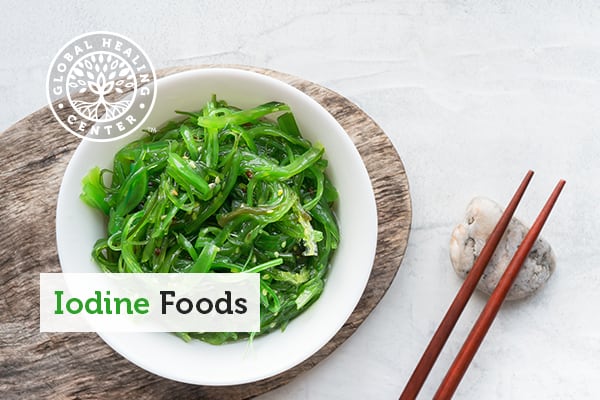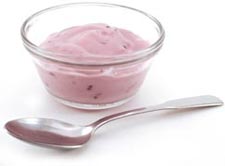
 The thyroid gland synthesizes thyroid hormones and iodine is an essential trace mineral that is crucial for the thyroid to function properly.[1] Eating foods rich in iodine ensures the thyroid is able to manage metabolism, detoxification, growth and development.The good news is that there are many popular foods with iodine, all of which are easy to incorporate into your daily diet.
The thyroid gland synthesizes thyroid hormones and iodine is an essential trace mineral that is crucial for the thyroid to function properly.[1] Eating foods rich in iodine ensures the thyroid is able to manage metabolism, detoxification, growth and development.The good news is that there are many popular foods with iodine, all of which are easy to incorporate into your daily diet.
7 Foods Rich in Iodine
Video Length: 4 minutes
The Recommended Daily Allowance (RDA) for iodine is 150 micrograms daily for everybody over the age of 14. The RDA for children ages 1-8 is 90/mcg every day, ages 9-13 is 120/mcg every day. If you’re pregnant or breastfeeding, it is recommended that you get 290/mcg every day.[10]
Iodine Rich Foods
1. Sea Vegetables
The ocean hosts the largest storehouse of iodine foods, including Kelp, Arame, Hiziki, Kombu, and Wakame. Kelp has the highest amount of iodine of any food on the planet and just one serving offers 4 times the daily minimum requirement. 1 tablespoon of Kelp contains about 2000/mcg of iodine, 1 tablespoon of Arame contains about 730/mcg of iodine, 1 tablespoon of Hiziki contains about 780/mcg of iodine, 1 one inch piece of Kombu contains about 1450/mcg of iodine, 1 tablespoon of Wakame contains about 80/mcg of iodine. I recommend sprinkling these into soups or salads.
2. Cranberries
This antioxidant rich fruit is another great source of iodine. About 4 ounces of cranberries contain approximately 400/mcg of iodine. I recommend buying fresh organic berries or juice. If you buy cranberry juice from the store, be aware of how much sugar it contains.
3. Organic Yogurt

A natural probiotic, yogurt is an excellent iodine food you should add to your diet. One serving holds more than half of your daily needs. 1 cup contains approximately 90/mcg of iodine. Other than yogurt, here is a list of probiotic foods you should consider incorporating into your diet for added health benefits.
4. Organic Navy Beans
Many beans are a great food source of iodine and navy beans may top the list. Just 1/2 cup of these beans contain about 32/mcg of iodine. Beans aren’t just an iodine food, they are also incredibly high in fiber.
5. Organic Strawberries
This tasty red fruit packs up to 10% of your daily iodine needs in just a single serving. One cup of fresh strawberries has approximately 13/mcg of iodine. Try buying fresh, organic strawberries from your local farmer’s market, they do not disappoint!
6. Raw, Organic Cheese
Cheese is high in iodine, along with essential B vitamins, calcium, and protein. One ounce of raw cheddar cheese contains around 10-15 mcg of iodine. [10] Goat’s milk cheese is easier on the digestive system and contains slightly higher levels of calcium and protein. Dairy, whether raw or pasteurized, may not be the best choice for some people, especially those with sensitive digestive systems or individuals adhering to a vegan and/or vegetarian diet.
7. Organic Potatoes

Iodine Supplements
If you’re not a fan of the iodine foods listed above, then you can always take an iodine supplement. There are many different types of iodine supplements on the market, so knowing the differences between each is vital. I recommend a transformative nano-colloidal detoxified nascent iodine supplement, which the body is quickly able to turn into its own effective mineral iodides for maximum absorption.
Research has shown that a lack of dietary iodine may lead to enlargement of the thyroid gland[2], lethargy[3], fatigue[4], weakness of the immune system[5], slow metabolism[6], autism[7], weight gain[8] and possibly even mental states such as anxiety and depression[9].
Watch an In-Depth Video on
Everything You Need to Know About Iodine
Video Length: 60 minutes
References (10)
- Nussey S, Whitehead S. Endocrinology: An Integrated Approach. Oxford: BIOS Scientific Publishers; 2001. Chapter 3, The thyroid gland.
- Medline Plus. Goiter – simple. U.S. National Library of Medicine.
- Gastaldi R, Muraca M, Beltramo A, Poggi E. Iodine deficiency and its consequences for cognitive and psychomotor development of children. Italian Journal of Pediatrics. 2014;40(Suppl 1):A15. doi:10.1186/1824-7288-40-S1-A15.
- Zimmermann MB, Boelaert K. Iodine deficiency and thyroid disorders. Lancet Diabetes Endocrinol. 2015 Apr;3(4):286-95. doi: 10.1016/S2213-8587(14)70225-6. Epub 2015 Jan 13.
- Ahad F, Ganie SA. Iodine, Iodine metabolism and Iodine deficiency disorders revisited. Indian Journal of Endocrinology and Metabolism. 2010;14(1):13-17.
- Medline Plus. Iodine in diet. U.S. National Library of Medicine.
- Hamza RT, Hewedi DH, Sallam MT. Iodine deficiency in Egyptian autistic children and their mothers: relation to disease severity. Arch Med Res. 2013 Oct ;44(7):555-61. doi: 10.1016/j.arcmed.2013.09.012. Epub 2013 Oct 10.
- National Institute of Diabetes and Digestive and Kidney Diseases. Hashimoto’s Disease.
- Melish JS. Thyroid Disease. In: Walker HK, Hall WD, Hurst JW, editors. Clinical Methods: The History, Physical, and Laboratory Examinations. 3rd edition. Boston: Butterworths; 1990.
- National Institute of Health. Iodine. Office of Dietary Supplements. Fact Sheet for Health Professionals.



22 thoughts on “7 Foods Rich in Iodine”